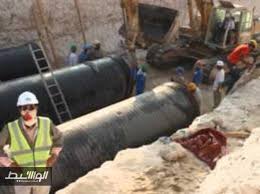
Nature of work
A wastewater process engineer designs systems for carrying away and treating wastewater from municipalities. It's important job because of the potential negative impact of poor water systems.The primary job of a wastewater engineer is to design systems that safely treat wastewater to remove any harmful substances and return it to the ecosystem. He/she lays out the specifications for pumping and lifting systems that bring wastewater to the treatment plants. He/she also lays out specifications for the flow of the wastewater through the system. He/she researches, designs, plans, or performs engineering duties in order to prevent, control, and remediate environmental hazards using various engineering disciplines. Work may include waste treatment, site remediation, or pollution control technology. He/she develops plans for new water resources or water efficiency programs, designs water distribution systems to potable or no potable water, designs sludge treatment plants. He/she provides technical support on water resource or treatment issues to government agencies conducts water quality studies to identify and characterize water pollutant sources, and analyzes and recommends sludge treatment or disposal methods.
Environment of work
Unsocial working hours may be a feature of some jobs, especially when meeting deadlines. Site work, in particular, may involve long hours as well as travel. Staff with operational responsibilities or flood monitoring duties may be on a call-out Rota for out-of-hours emergencies. There is a mixture of office and site-based duties and the latter may be dirty, wet and cold. Self-employment/freelance work is possible in consultancy for the engineer with substantial and wide experience. The dress code depends on whether the job is office based or on-site. If his/her job involves working on shifts this may have an impact on his/her social life. Travel within the working day to visit sites is common. Absence from home at night is occasional, mainly associated with training courses or emergency call-outs. The extent of overseas travel depends on the type of employer. Assignments ranging from a few weeks to a couple of years are possible in the private sector. Professional life
A wastewater process engineer may need to take on considerable responsibilities quickly, such as managing a project, controlling large-cost budgets or supervising a team of new graduates. There is plenty of scope to progress to management positions, particularly if he/she is prepared to study for further business-related qualifications. It is also possible to reach higher salary grades through the development of further technical expertise, where management responsibilities may not be required. Movement between private and public sectors is relatively easy once sufficient experience has been gained. Relevant vacation work or an industry placement year can improve his/her chances, along with a demonstrable interest in water engineering, environmental issues or public health evidenced through academic projects or water-related modules undertaken as part of his/her degree/postgraduate study.Range of typical starting salaries: 50000 SYP.
Getting the job
Employers require that a wastewater process engineer has at least a bachelor of science degree in civil, chemical or environmental engineering. Some employers prefer engineers with a master's degree. A wastewater process engineer is required to have the Order of Syrian engineers certification, as well as experience managing sewer rehabilitation, water systems and ground storage tanks. A master's degree is not required for most entry level wastewater engineering jobs, but may be required for higher level and management positions. Skills
A wastewater process engineer should have excellent project management skills and be able to work efficiently under minimal supervision. He/she should work well in groups. Leadership skills are required; he/she will be required to supervise projects from start to completion. Some wastewater professionals also mentor junior-level engineers. Critical thinking - using logic to identify the strengths and weaknesses of alternative solutions, conclusions or approaches to problems. Complex problem solving - identifying complex problems and reviewing related information to develop and evaluate options and implement solutions. Judgment and decision making - considering the relative costs and benefits of potential actions to choose the most appropriate one. Systems analysis - determining how a system should work and how changes in conditions, operations, and the environment will affect outcomes. Sources and references
If you need any further information on what is included in this file, you can visit the following websites:- The Order of Syrian engineers, Damascus, Tel: 6627256
- www.arab-eng.org, Arab Engineers Forum.
- Arab Standard Classification of Occupations, 2008, Ed. Arab Labor Organization.
